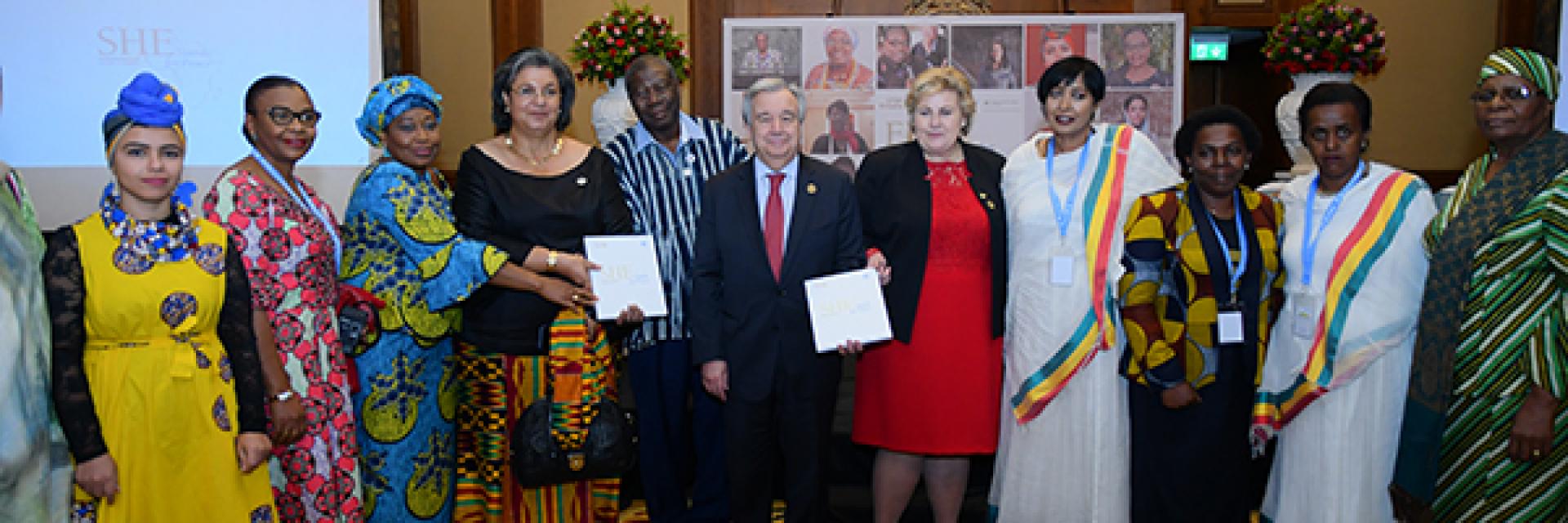Addis Ababa, Ethiopia, February 09, 2020 (ECA) – The world needs to do more to ensure women’s equal participation in peace processes, United Nations Secretary-General António Guterres said Saturday night.
Speaking at the launch of a book jointly produced by the African Union Commission (AUC) and the UN called She Stands for Peace: 20 years, 20 journeys, the UN Chief said despite the landmark Security Council resolution 1325 on Women, Peace and Security, to empower women in their own right, the “positive trend” in recent years towards consideration of the gender perspective in conflict resolution had gone into reverse.
“We need to do much more to ensure women’s equal participation in peace processes, and to put survivors at the heart of our approach to sexual and gender-based violence in conflict,” he said.
“The absence of women at the table is also linked to entrenched mindset and social perception issues, for by now we are all aware of studies that prove women’s participation to greatly increase the chances of a peace agreement being long lasting.”
Gender inequality, he added, was a question of power.
“This demonstrates that men are not so easy in leaving power. Power is not easily granted. Power needs to be taken. That is why it is so important that power changes and more women are in position of responsibility in governments, on boards and the United Nations,” said Mr. Guterres.
“We need to do more to challenge and shift the overall power dynamics in society. For example, we need more women presidents, parliamentarians, hedge fund managers and CEOs.”
The book captures the stories of outstanding African women and women-led organizations who have worked tirelessly towards building a lasting peace on the continent over the last 20 or more years.
“What these remarkable women have in common is their work to promote peace and mediate conflicts in communities”, said Mr. Guterres, “often without recognition or payment, and sometimes at great personal risk. They are pathfinders, leaders; pioneers and courageous innovators.”
He said more than anything, the women in the book “want less talk about women, peace and security, and more action. The women in this book are counting of us, the international community, and on their leaders and the leaders of other nations to do more than make speeches about them. They want actual investment in them as equal stakeholders who care about the future of their communities and nations. They know in intimate detail – equal to their male counterparts – the logistics, tactics, violence and human cost of war.”
Norwegian Prime Minister, Erna Solberg, was among top dignitaries at the launch.
“The launch of this truly significant book highlights the journey that these remarkable women have travelled towards peace. Theirs are stories of resilience, strength, inspiration, hope and what people can achieve working together,” she said, adding more remained to be done to ensure women in peacekeeping do not continue to be side-lined with their stories ‘untold, unrepeated and unshared’.
AUC deputy Chairperson, Thomas Quartey Kwesi applauded the two organisations for putting the book together to chronicle the journey traversed by the women towards lasting peace in their communities.
“The landmark Security Council resolution 1325 on Women, Peace and Security was the first step of acknowledging the strategic importance of women in peacebuilding, mediation and reconstruction of conflict-torn communities,” said Mr. Kwesi.
The book features an enormous variety of women involved in various peacebuilding efforts; from rural villages and cities; from privileged upbringings and from humble backgrounds.
Issued by:
Communications Section
Economic Commission for Africa
PO Box 3001
Addis Ababa
Ethiopia
Tel: +251 11 551 5826
E-mail: eca-info@un.org

